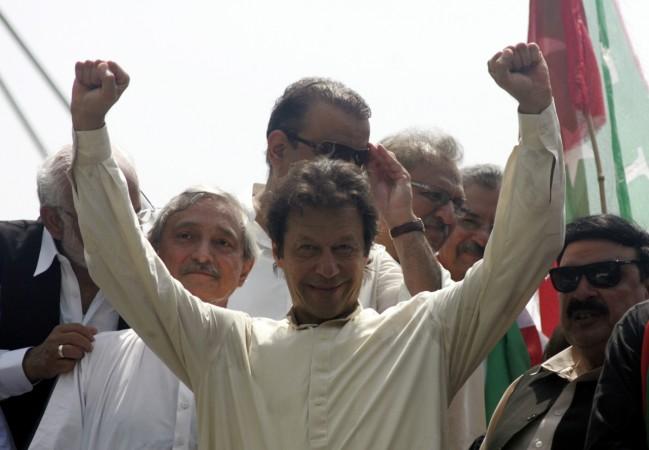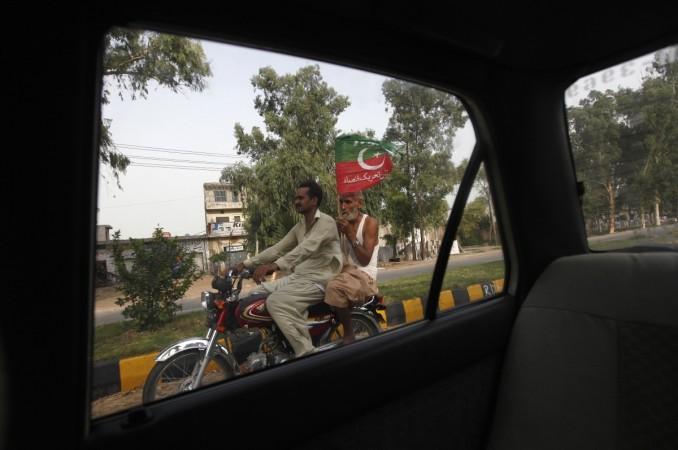
Two large anti-government movements entered the Pakistani capital late on Friday night, presenting the 15-month-old civilian government with its biggest challenge yet.
Former cricketer Imran Khan, who heads the opposition Pakistan Tehreek-e-Insaaf party, and populist cleric Tahir ul-Qadri say they will occupy main streets until Prime Minister Nawaz Sharif resigns.
The unrest has raised questions Pakistan's stability, at a time when the nuclear-armed nation of 180 million is waging an offensive against Pakistani Taliban militants and the influence of anti-Western and sectarian groups is growing.
Earlier on Friday, a stone-throwing mob attacked Khan's convoy as he led supporters through the eastern city of Gujranwala. Men brandishing ruling-party posters attacked his convoy, throwing shoes and stones.
Khan's convoy was shot at but he was not injured, his spokeswoman said. The government insisted shots were not fired, and police arrested 16 activists from the ruling party.
"All those responsible for scuffle will be held accountable," a government statement said. "There were absolutely no gunshots fired at his rally and such PTI-driven sensationalism is unfortunate."
In the capital, authorities blocked main roads with shipping containers and barbed wire in a effort to control the marches.
Riot police were out in force, but thousands of protesters began to gather, singing and dancing despite a light rain as they prepared to welcome Khan to the city. The mood was festive, with many protesters snapping photos of each other or swapping jokes with police.
"We think Imran Khan will make a better country for the youth," said 25-year-old Muhammad Taraki at Khan's rally point. "I have a bachelor's degree, but I cannot get a job."

Some members of Sharif's party have suggested the protests are secretly backed by elements in the military, which has had an uneasy relationship with Sharif. To what extent Khan and Qadri can destabilise the government is likely to depend on the stance taken by the armed forces, which has a long history of mounting coups.
Few people fear a coup, but many officials think the threat of unrest will increase the military's hold over the government.
The military has been frustrated with the government, in particular over the prosecution of former army chief and president Pervez Musharraf for treason.
There has been disagreement, too, between the government and the army on how to handle the Taliban. The government insisted on peace talks but eventually the army launched an offensive.
In the latest Taliban violence, 11 militants were killed and 13 members of the security forces were wounded in attacks on two air force bases in the city of Quetta late on Thursday, the third time since June airports had been hit by deadly attacks.
REFEREE?
The government is also struggling to overcome power shortages, high unemployment and spiralling crime - the legacy of decades of corruption and neglect. Anger over the economy means the protests appeal to many disillusioned young Pakistanis.
Both protest leaders also command intense personal loyalty from their followers. Khan is a famed former international cricketer, known for his charity work, who now heads the third- largest legislative bloc in the country. He is protesting alleged irregularities in last year's voting.
Qadri, a cleric and political activist who usually lives in Canada, controls a network of schools and Islamic charities. His followers intend to occupy Jinnah Avenue, Islamabad's main thoroughfare.
"We will not go back until Sharif resigns," said Qadri's spokesman, Shahid Mursaleen. "They killed our people. There is no way we can make a deal with them."
Qadri has accused police of killing 22 of his supporters during clashes in the eastern city of Lahore in June and this month. Police confirmed 11 deaths. About 2,000 of Qadri's supporters were also arrested this month, police said.
Most observers expect the military to play referee - to maintain security but not support action to force Sharif out.
"Imran will not get from the army what he was expecting," said an analyst close to the military. "If there was any confusion earlier about whether the army would help Imran or rescue him or topple the government, there should be none now. There is no question of army intervention."

















